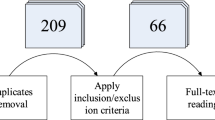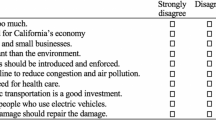Abstract
The "Stated Adaptation" survey is an interactive technique which allows us to obtain a clearer picture of the attitudes and behaviours of individuals when confronted with hypothetical situations, in particular inexperienced travel conditions. This method makes use of a simulation game whose purpose is to explore on small samples individuals' choice processes when selecting between the different transport alternatives which are available to them. This paper describes how gaming-simulation is designed, with reference to the issues tackled by two surveys which have recently been carried out in France (reactions to urban road pricing and perception of electric vehicles). It describes the benefits of this experimental approach which allows stated behaviours to be checked to a considerable degree. The limits and potential developments of this survey technique are also discussed.
Similar content being viewed by others
References
Bonnel P, Chapleau R, Lee-Gosselin M & Raux C (1997) Les enquêtes de déplacements urbains. Mesurer le présent, simuler le futur. Editions du Programme Rhône-Alpes Recherches en Sciences Humaines, Centre Jacques Cartier, Lyon, 513 p.
Faivre d'Arcier B, Nicolas JP & Andan O (1996), Les réactions à la voiture électrique — recherche exploratoire sur les comportements et les attitudes des ménages. Rapport INRETS n° 210, France: Arcueil.
Gärling T (1997) Reintroducing attitude theory in travel behaviour research: The validity of an interactive interview procedure to predict car use. Transportation.
Jones P (1979) HATS: A technique for investigating household decisions. Environment and Planning, A 11.
Kurani K, Turrentine T & Sperling D (1994) Demand for electric vehicles in hybrid house-holds: an exploratory analysis. Transport Policy 1(4): 244-256.
Kurani KS, Turrentine T & Sperling D (1996) Testing electric vehicle demand in “hybrid households” using a reflexive survey. Transportation Research D 1(2).
Lee-Gosselin M (1990) The dynamics of car use patterns under different scenarios: A gaming approach. In: Jones P (ed) Developments in Dynamic and Activity-Based Approaches to Travel Analysis. Aldershot, UK: Oxford Studies in Transport, Gower Press.
Lee-Gosselin M (1996) The scope and potential of interactive stated response data collection methods. In: Household Travel Surveys Transportation Research Board Proceedings 10, Washington DC.
Pearce DW & Markandya A (1994) L'évaluation monétaire des avantages des politiques de l'environnement. Paris, France: OCDE.
Polak J & Jones P (1997) Using stated-preference methods to examine travellers preferences and responses. In: Stopher & Lee-Gosselin (eds) Understanding Travel Behaviour in an Era of Change (pp 177-207). Pergamon.
Raux C, Andan O & Godinot C (1994) The simulation of behaviour in a non experienced future: the case of urban road-pricing. Seventh International Conference on Travel Behaviour Proceedings, 13-14 June.
Raux C, Andan O, Faivre d'Arcier B & Godinot C (1995) Les réactions au péage urbain. Enquête exploratoire. Etudes et Recherches, Laboratoire d'Economie des Transports, Lyon, 163 p.
Soguel N (1994) Evaluation monétaire des atteintes à l'environnement: une étude hédoniste et contingente sur l'impact des transports, Imp. L'Evole SA, Neuchâtel, Switzerland.
Stopher P (1997) Current transportation planning and modelling data needs in the USA: A review of separate and joint strategies for the use of data on revealed and stated choice, in Bonnel et al. (1997) op. cit.
Stopher P & Lee-Gosselin M (eds) (1997) Understanding Travel Behaviour in an Era of Change. Pergamon, 583 p.
Turrentine T, Lee-Gosselin M, Kurani K & Sperling D (1992), A study of adaptative and optimizing behavior for electric vehicles based on interactive simulation games and revealed behavior of electric vehicle owners, paper at the 6th WCTR, Lyon.
Author information
Authors and Affiliations
Rights and permissions
About this article
Cite this article
D'Arcier, B.F., Andan, O. & Raux*, C. Stated adaptation surveys and choice process: Some methodological issues. Transportation 25, 169–185 (1998). https://doi.org/10.1023/A:1005042505063
Issue Date:
DOI: https://doi.org/10.1023/A:1005042505063




